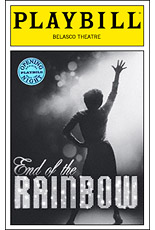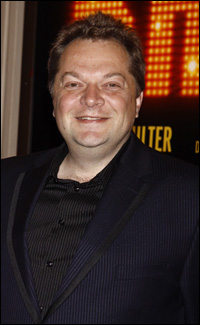
*
Formally (or funereally) attired first-nighters tuxed up for End of the Rainbow, a posthumous date with Judy that bowed April 2 at the Belasco Theatre.
Tracie Bennett arrived at her ritzy after-party on Garland Standard Time — fashionably late enough to make for a star entrance up the stately marble stairs of the Plaza Hotel and into a blinding blast of paparazzi pandemonium.
The inescapable irony about her playing one of the greatest singers of the 20th century — some would say the greatest — is that Bennett stubbornly insists she's not a singer. She is an actress, first and foremost, who sings through the character she happens to be inhabiting at the time. This technique has won her two Oliviers — both times for musicals — and she has been nominated for two more.
Her Olivier nomination for End of the Rainbow was in the nonmusical category, although almost a third of the show is consumed with her remarkable spot-on impersonation of Garland in song at the bitter end of her life. "It's not like everybody's singing songs, so I don't think it should get an award for musical," she said. "It's funny even talking like that, because I've never done things for awards."
Nevertheless, she gets them — one for She Loves Me, the other for Hairspray. "I know, and they're a joy, but to me it's great for marketing a show. If I see a film has ten Oscars, I'll have a look at it. I've always found it quite strange to compete with emotions. I could see it if everyone was doing the same part. I always feel for Tony voters or Olivier voters because it's random personal choice. It must be. I don't know how they vote.
"It would be amazing to me. I'd feel like I won something if I was even nominated."
Giving that kind of dynamo performance eight times a week would seem to be impossible, and she agreed: "Yes, it is — if you didn't prepare. It would be a nightmare. Yes, it is — if I didn't have a brilliant team around me. Everybody has made it easier. The cast is brilliant, the creative team sublime — they're the best in the world — the best designer, we've got a great band, great lighting, everything helps. You put the costume on, and then everybody does their department. It helps you get on. There's no mystery. Don't ever let lead actresses tell you there's a mystery. You do your own work. You have a good work ethic. You sleep, you eat right — and then you have a life and you drink cosmopolitans and fight at the same time. It's all about balance. No mystery. Just working hard and applying yourself and committing yourself.
"Yes, it's hard mentally. Yes, it's a massive concentration thing — but that's what I do, and I have to take responsibility for that, and I love it, and I do skip to work."
[flipbook]
Wild horses couldn't drag out of Peter Quilter's mouth the name of the singer who prompted him to write End of the Rainbow. It wasn't Judy Garland. It wasn't even a female, he said. "I got to know a singer on the cruise ships and would witness this awful fight for his soul that went on each night before the show, his wife saying, 'Get on that stage and do that show,' and him saying, 'I can't do it anymore. I can't do it anymore.'
"I really just wrote a play, and, somewhere in the process, I thought, 'This will work better with a female' so I made the character female. Then there came a point where I had to choose the songs. The songs I love — many of them — are in the repertory of Judy Garland so, when the show went on — because it was loaded with those songs, people said, 'Why don't you make it Judy Garland because it's the shadow of Judy Garland anyway?' I resisted it a couple of years, and, when I finally did it, it took off.
"Honestly, what interested me genuinely was the character and the situation. I really didn't want to do a Judy Garland show. I wanted to do a show that investigated a woman in that situation. It was incredible. Here she was, performing brilliantly one night and terribly the next, desperately looking for love, picking the wrong men, trying to get off drugs, taking drugs. It was a car-crash of different things.
"That was my interest. Any references to Judy Garland were just because I found it was necessary to give the audience a little information, but, really, if you boiled the play down, you'd probably find there's only 10 percent information in there and it's 90 percent emotion/drama/character. We made references to 'Wizard of Oz,' her ex-husbands, stuff like that, but it really does focus on the real woman as opposed to the icon. We wanted to show Judy Garland as she was at that terrible time in her life, and, through that, I think people get to love the icon even more."
Terry Johnson, whose recent revival of La Cage aux Folles won both the Olivier and the Tony, saw his task here more as referee than as director.
"When I got the show," he said, "I did less research on Judy Garland. Tracie knows so much about her I decided not to look too hard. I thought I'd be better off if I was the person in the room, saying, 'Well, I buy that,' or 'I don't buy that,' 'That, I believe,' or 'That, I don't.' Tracie would go, 'Yeah, but this is true,' and I'd go, 'Yeah, but where is it in the play?' So, in a way, I kept myself a little bit of a blank slate so I could keep seeing the play as well as her interpretation of Judy. I kinda trusted that anything Tracie did was true. It was my job to tell her what was true and appropriate.
"The best thing I heard last night was a member of the audience who said to her companion on the way out, 'How can something so tragic be so celebratory?' I love that comment. If we've managed that, that's the attempt, isn't it? You want to show what that extraordinary talent — any extraordinary talent — actually costs."
The mutual trust between the two goes back a while. "She did a play of mine 17 or 18 years ago," said Johnson, whose sole Broadway credit as a playwright is The Graduate . "I've known her a long time. I don't think people quite realize how serious an artist Tracie Bennett is. Maybe now they do. Tracie Bennett has to be working every day of her life, and she has done some stunning work in American musicals in Britain."

Buy this Limited Collector's Edition |
Cumpsty gives a charming account of this character but didn't base it on anyone per se. "Before I met Tracie, I thought I'd have to do a lot of research on Judy Garland — see all the movies, read all the books — and then I met Tracie. Tracie is a force of nature. She's absolutely incredible. She's the most energized, committed person I ever worked with. I am mad for her. I thought, 'I won't have to do a lot of substitution. I can just respond to Tracie Bennett, and it will be like an adoring gay fan, adoring this force of nature and trying to support her and sorta keep her safe.' And that's what I do. I do it about Tracie. I don't do it about Judy because Tracie so completely inhabits that kind of personality that it's easy just to have a relationship with her in this."
The good news for Tom Pelphrey is that his making his Broadway bow with End of the Rainbow. "This is what you dream for when you're young and you start acting. I am honored that I made my Broadway debut — and specifically glad it happened with these people. They've been very generous to me."
The bad news is he's making his debut as Mickey Deans, Garland's fifth husband and fatal enabler — an all-round singularly unpleasant person to spend time with, even two hours on a stage. The actor read Deans' side of it (borrowing a title from Judy's repertoire for his book: "Weep No More, My Lady"), watched interviews with him and Judy and finally found a sympathetic way into the character as one Jersey boy to another.
| |
 |
|
| Peter Quilter | ||
| Photo by Joseph Marzullo/WENN |
Proximity to Bennett-in-full-stage-flight is inspiring to him, he confessed: "With her energy and commitment to it, you cannot not give 200 percent. None of us know how she does this eight times a week. She is a miracle. And the audience response! Have you ever seen anything like that? It's like a rock concert."
Standing beautifully by for Bennett is a Beauty and the Beast Belle, Sarah Uriarte Berry, who's not looking forward to the day when she slips on the star's ruby slippers. "She knows that I know that it's next to impossible to do what she does. It's, like, one of the most amazing performances I've ever seen — I think, that anybody has ever seen. It's one of the ones that's going to go down in the history books. I'm more than intimidated. She's really it."
The first review to reach the party was from Broadway's last Judy, Isabelle Keating, who copped a Tony nomination for it in The Boy From Oz.
"A tour-de-force," declared Keating, who played a Judy four years younger. "Just stunning. What an amazing voice Tracie has. She has her own unique thing but it's so Judy! I have not met Tracie yet. We spoke on the phone briefly, and what she says about acting Judy more than singing Judy I concur with completely. It's what I did. She's a phenomenal actress. I'm still somewhat overcome. It's breathtaking!"
Keating, currently on Broadway as Spider-Man's Aunt May, lamented not meeting Rosemary Harris, who originated that role in the movie, when she was right next door doing The Road to Mecca.
Molly Ranson (carrying on Carrie another week) and Kathleen Chalfant (Painting Churches 'til April 7) spent their nights off at the theatre, as did Memphis' Tony-nominated Montego Glover, Other Desert Cities' Stacy Keach, Anything Goes' Joel Grey and Don't Dress for Dinner's Jennifer Tilly.
The most unexpected first-nighter of the evening was Barbara Windsor, who is best-known for the "Carry On" films, a black-and-white knockabout comedy series. One alum made it to these shores and won a Tony for Barnum: Jim Dale, and even Windsor made it to Broadway once, grabbing a 1965 Tony nomination for Best Featured Actress in a Musical for Joan Littlewood's Oh What a Lovely War. "When I was on Broadway, Barbra Streisand, Sammy Davis Jr., Carol Channing were all surrounding our little show."
But it's the "Carry On" capers that cling to her. "The funny thing is they show them all the time on the telly back home. It was a period of my life that's stayed with me. My life was theatre. I would just make a film and then go off to the theatre at night."
Elaine Stritch, who hoisted a few with Judy in Londontown, led the opening-night parade, followed by Tovah Feldshuh; Lindsay Nicole Chambers andColin Hanlon; columnist Michael Musto ("Tracie is a force of nature, but I thought the direction was more over the top than over the rainbow"); Larry Kramer, resplendent in a purple jacket; Ron Raines, turning out to support his "Guilding Light" co-star, Pelphrey, before heading to L.A. for the May 3 opening of Follies; Curtains couple Debra Monk and Edward Hibbert and Lisa Lampanelli.


























































